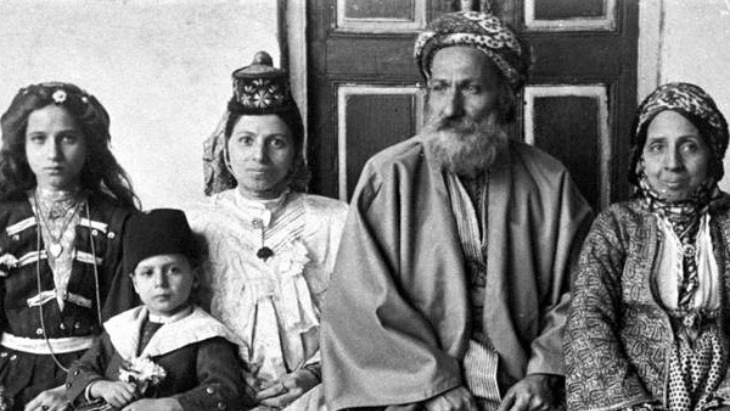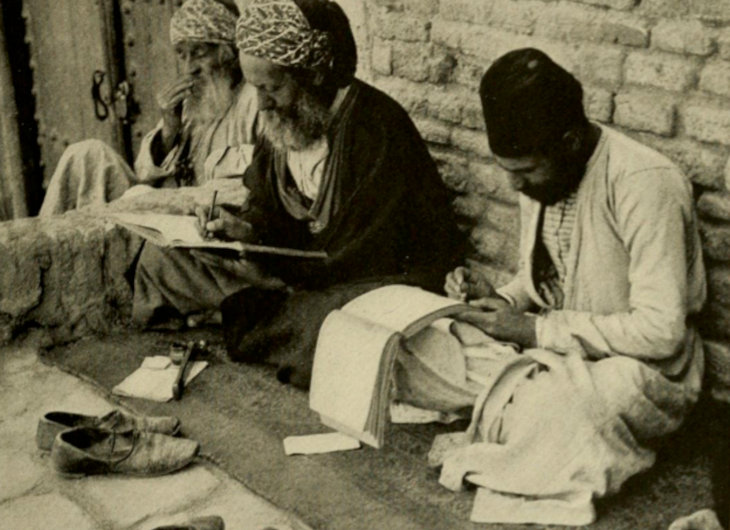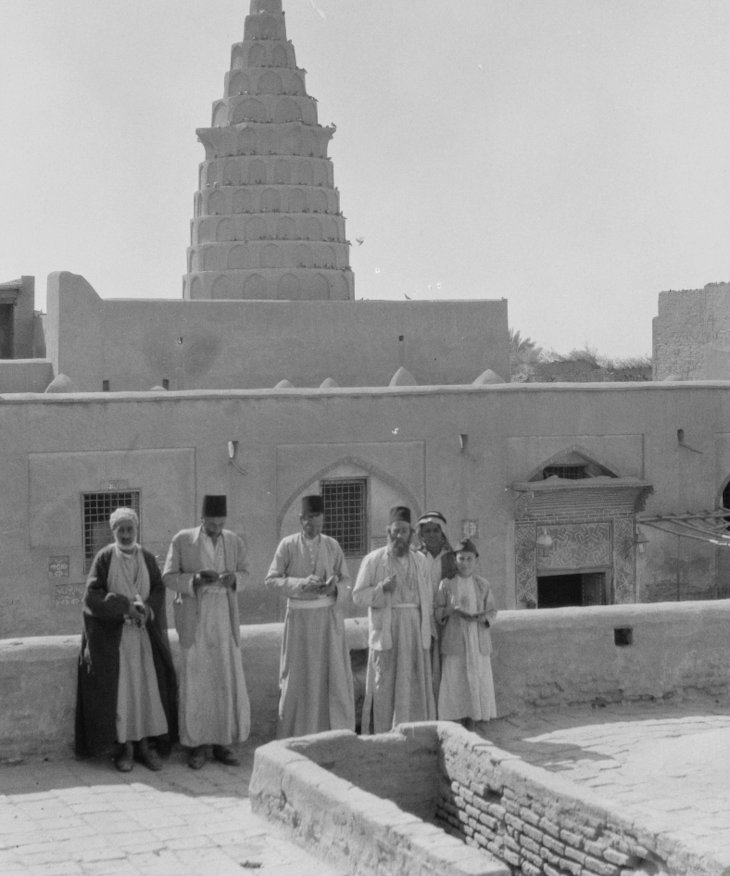 Raise a Glass to Freedom
Raise a Glass to Freedom

Jewish Geography

Jewish Geography
5 min read
Explore one of the oldest and most significant diaspora Jewish communities of all time.
While some identify the city of Ur, the birthplace of Abraham, in modern-day Iraq or Babylonia, the history of the ancient Jewish community "By the rivers of Babylon” (Ps. 137:1) is generally considered to begin in the sixth century BCE. In that early period, from 587-538 BCE the Jews were held captive as slaves in Babylonia upon the conquest of Jerusalem and destruction of the First Temple by the Babylonian King Nebuchadnezzar.
Even while the subsequent Persian ruler of Babylonia, King Cyrus, permitted the Jewish captives to return to Jerusalem and re-build the Second Temple in 538 BCE, many chose to stay in the fertile land between the Tigris and Euphrates rivers. One of the oldest and most influential diaspora Jewish communities of all time was established on these lands.
 Jewish scribes at Ezekiel's Tomb, 1914
Jewish scribes at Ezekiel's Tomb, 1914
From approximately the year 225 CE until 1000 CE, the Jewish community of Babylonia is recognized as the capital of worldwide Torah study and is credited with preserving and transmitting rabbinic traditions from the ancient to medieval periods. There, around the year 225 CE, Rav or Abba Arikha established the Sura Academy in southern Iraq, which continued to operate until the conclusion of the Geonic period in the eleventh century.
Rav, a student of Rabbi Judah the Prince in the land of Israel, traveled to Iraq with the Mishna, beginning the period of intensive study and debate of Jewish law that culminated in the compilation of the Babylonian Talmud by Rav Ashi in the fifth century. Upon the completion of the Talmud, leaders of the Rabbinic seminaries in Sura and Pumbedita or “Geonim” continued to serve the Jewish people’s religious and philosophical needs by answering questions that were sent from around the world. These “questions and answers” were collected and published, and remain an important basis of contemporary Jewish law, in addition to precious historical sources for this early period of Jewish history.
 Jews praying at Ezekiel's tomb in al-Kifl, Iraq
Jews praying at Ezekiel's tomb in al-Kifl, Iraq
With the flourishing of Jewish communities in Ashkenaz, France, North Africa and Egypt in the Medieval period, in addition to the brutal invasion of Iraq by Genghis Khan in 1238 CE, the Jewish community of Iraq’s status and significance as a center of Jewish life declined rapidly. It was not until many years later in the nineteenth century, under the leadership of Rabbi Abdallah Somekh (1813-1899) and his student Rabbi Yosef Hayyim, the “Ben Ish Hai” (1834-1909), that Iraq re-emerged as an important center of Jewish culture and religious education. In this period, Iraqi Rabbis guided the growing Jewish communities of the East – particularly India and China – as Jews played a central role in the globalization of trade and finance in these emerging markets.
 Flora Sassoon, Jewish-Indian businesswoman, philanthropist and scholar
Flora Sassoon, Jewish-Indian businesswoman, philanthropist and scholar
One interesting example, capturing the fidelity of Babylonian Jewry to their ancient traditions in addition to a general open mindedness to progress and innovation, is the story of the Sassoon family and Flora Sassoon. The Sassoon family, nicknamed the “Rothschilds of the East” for their immense wealth, are best known for advancing global trade to India by building the ports of Bombay (Mumbai) used until this day. Flora Sassoon (1859-1936), the spouse of Solomon David Sassoon, is well known for running the Sassoon family empire upon her husband’s passing, in addition to her philanthropic and scholarly endeavors. A devout observant Jew, she maintained personal correspondence with leading Rabbis of her day, and even managed to publish scholarly articles on various Torah subjects in her spare time.
The fate of the Jewish community in Iraq suffered a sudden decline in 1941, when antisemitic violence broke out in the streets of Baghdad, killing hundreds of Jews. After thousands of years of relative tranquility and peace as a religious minority, the Jewish community of Iraq could no longer trust the newly-founded Iraqi government after their inflammation of ethnic tensions and deprivation of the Jews’ full political rights. Upon the founding of the State of Israel in 1948, over 90 percent of the Jews of Iraq chose to relinquish their Iraqi citizenship at the first opportunity and make Aliyah to Israel in 1951 in “Operation Ezra and Nehemia.”
 The Great Synagogue of Baghdad circa early 20th century
The Great Synagogue of Baghdad circa early 20th century
To this day, Iraqi Jews maintain a distinct identity and are prideful of their ancient heritage, with communities around the world and Iraqi synagogues located in London, Los Angeles, New York, and Toronto. In Israel, the early arrival of Iraqi Jews in 1951 has profoundly shaped Israeli culture. For example, many of the leading Sephardic Rabbis in Israel are of Iraqi descent, including the famous Chief Rabbi of Israel, Rabbi Ovadia Yoseph (1920-2013).
Iraqi foods, such as the sabich sandwich, kubbeh soup, and amba are staples of Israeli cuisine and are found in restaurants across the country. Even classical Iraqi music, pioneered by the Jewish Al-Kuwaity brothers, Daoud and Saleh, has achieved international popularity thanks to the Israeli group Dudu Tassa & The Kuwaitis (Dudu Tassa being the grandson of Daoud Al-Kuwaity).
First brought to Babylon as slaves, the Jews of Iraq persevered, survived and flourished in their new home “between the two rivers.” Their mark on Jewish history is lasting and enduring, and uniquely impacted the development of Judaism in an early, formative period. Even while Iraq largely remains unsafe for tourism, a small community of Jews continues to live in northern Iraq/ Kurdistan and many more Iraqi Jews safeguard their relationship to Iraq and the Iraqi people communicating in Arabic in popular social media groups such as “Iraqi Jews.”

On May 27, 2022, Iraq passed a law making contact with Israel punishable by death.
The number of living Jews in Iraq is three (2022)